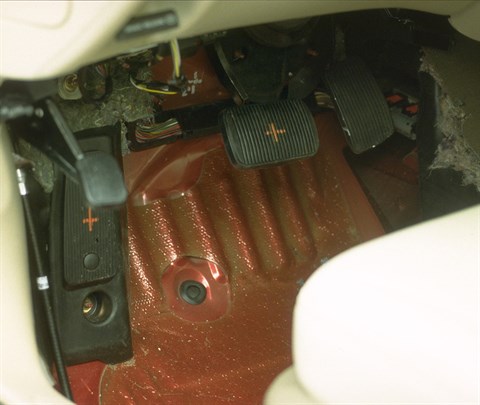Moderate overlap front: original test
Rating applies to 2000-05 models
Tested vehicle: 2000 Ford Taurus SE 4-door
The Ford Taurus and the Mercury Sable were redesigned for the 2000 model year to provide more advanced occupant restraint features. The Sable was discontinued after the 2005 model year, and the 2006 Taurus was sold primarily to fleets. The Taurus was then discontinued after the 2006 model year.
| Evaluation criteria | Rating |
|---|---|
| Overall evaluation | |
| Structure and safety cage | |
| Driver injury measures | |
| Head/neck | |
| Chest | |
| Leg/foot, left | |
| Leg/foot, right | |
| Driver restraints and dummy kinematics | |

Action shot taken during the frontal offset crash test.

The dummy's position in relation to the steering wheel and instrument panel after the crash test indicates that the driver's survival space was maintained well.

Intrusion into the driver's space was minimal, and all leg and foot injury measures were low.

Power-adjustable brake and accelerator pedals that move back and forth are an option that allows drivers of varying heights to maintain a safe distance from the steering wheel yet still reach the foot pedals.
Measures of occupant compartment intrusion on driver side
| Evaluation criteria | Measurement |
|---|---|
| Test ID | CF00010 |
| Footwell intrusion | |
| Footrest (cm) | 8 |
| Left (cm) | 12 |
| Center (cm) | 14 |
| Right (cm) | 13 |
| Brake pedal (cm) | 14 |
| Instrument panel rearward movement | |
| Left (cm) | 2 |
| Right (cm) | 1 |
| Steering column movement | |
| Upward (cm) | 6 |
| Rearward (cm) | 1 |
| A-pillar rearward movement (cm) | 3 |
Driver injury measures
| Evaluation criteria | Measurement |
|---|---|
| Test ID | CF00010 |
| Head | |
| HIC-15 | 170 |
| Peak gs at hard contact | no contact |
| Neck | |
| Tension (kN) | 1.4 |
| Extension bending moment (Nm) | 13 |
| Maximum Nij | 0.27 |
| Chest maximum compression (mm) | 28 |
| Legs | |
| Femur force - left (kN) | 2.1 |
| Femur force - right (kN) | 1.2 |
| Knee displacement - left (mm) | 0 |
| Knee displacement - right (mm) | 3 |
| Maximum tibia index - left | 0.43 |
| Maximum tibia index - right | 0.67 |
| Tibia axial force - left (kN) | 1.0 |
| Tibia axial force - right (kN) | 2.4 |
| Foot acceleration (g) | |
| Left | 51 |
| Right | 50 |
Head restraints & seats
Seat type: All seats
| Overall evaluation | |
|---|---|
| Dynamic rating | |
| Seat/head restraint geometry |
| Seat type | All seats |
|---|---|
| Geometry | |
| Backset (mm) | 52 |
| Distance below top of head (mm) | 65 |
| Seat design parameters | |
| Pass/fail | Fail |
| Max T1 acceleration (g) | 10.7 |
| Head contact time (ms) | 118 |
| Force rating | 3 |
| Neck forces | |
| Max neck shear force (N) | 377 |
| Max neck tension (N) | 1,220 |
About the head restraint & seat test
Currently, IIHS tests apply only to front seats.